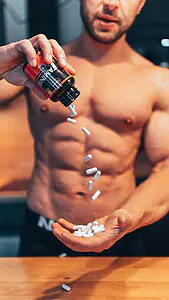Navigating Men’s Hormonal Changes with Age: Understanding and Maintaining Hormonal Balance
Published on / By Sully / No Comments / Health & Wellness

As men age, their bodies undergo a variety of physiological shifts, one of the most significant being changes in hormone levels. While hormonal changes are often associated with women, particularly during menopause, men also experience a gradual decline in key hormones, particularly testosterone, which can affect various aspects of their health and well-being.
We explore the hormonal changes men experience as they age, how these changes manifest, and practical strategies to maintain hormonal balance through lifestyle choices. Understanding these shifts is crucial for men to take charge of their health, improve quality of life, and age with vitality.

The Role of Testosterone in Men’s Health
Testosterone is the primary male sex hormone, playing a key role in maintaining muscle mass, bone density, sex drive, mood, and cognitive function. It also influences body fat distribution and red blood cell production. Peak testosterone levels typically occur during adolescence and early adulthood but gradually decline starting in a man’s late 20s or early 30s. Research from Harvard Health suggests that while testosterone levels naturally decline with age, a healthy lifestyle can mitigate many of the associated symptoms and support hormonal balance.
The decline is slow but steady, averaging about 1% per year. By the time a man reaches his 50s or 60s, he may experience noticeable effects of lower testosterone, sometimes referred to as “andropause” or “male menopause.”
Symptoms of Hormonal Imbalance in Aging Men
As testosterone levels decrease, men may experience a range of symptoms. These can vary in severity, depending on overall health, genetics, and lifestyle. Common symptoms include:
- Reduced Energy Levels: Many men report feeling more fatigued and having less stamina as their testosterone levels decline.
- Decreased Libido and Sexual Performance: Lower testosterone often leads to a reduced interest in sex and can contribute to erectile dysfunction.
- Mood Changes: Men with declining testosterone levels may experience mood swings, increased irritability, or even symptoms of depression.
- Loss of Muscle Mass and Strength: Testosterone plays a crucial role in muscle maintenance. With its decline, muscle mass and strength may decrease, making physical activities more challenging.
- Increase in Body Fat: Hormonal shifts can lead to changes in fat distribution, often resulting in an increase in abdominal fat.
- Cognitive Changes: Some men notice memory issues or difficulties with concentration and mental clarity as they age.
While these changes are normal, they can affect a man’s quality of life and sense of well-being. The good news is that lifestyle choices can significantly influence hormonal balance and help mitigate some of these effects.
Maintaining Hormonal Balance Through Lifestyle Choices
Maintaining hormonal balance as men age involves addressing various aspects of health, including diet, exercise, sleep, and stress management. Here’s how men can support their hormonal health:
1. Adopt a Nutrient-Dense Diet
A healthy, balanced diet plays a vital role in maintaining hormonal balance. Key nutrients like zinc, magnesium, and vitamin D are essential for testosterone production. Here are some dietary tips:
- Increase Healthy Fats: Testosterone is derived from cholesterol, so it’s important to include healthy fats in the diet. Avocados, olive oil, nuts, seeds, and fatty fish (like salmon and mackerel) are great sources.
- Focus on Lean Protein: Adequate protein intake helps maintain muscle mass. Include lean meats, poultry, eggs, legumes, and plant-based proteins.
- Eat Cruciferous Vegetables: Vegetables like broccoli, cauliflower, and Brussels sprouts help metabolize estrogen, which can become elevated as testosterone declines.
- Limit Processed Foods and Sugar: Processed foods and high sugar intake can lead to weight gain and insulin resistance, both of which can negatively impact testosterone levels.
- Stay Hydrated: Dehydration can stress the body and negatively affect hormone production. Drink plenty of water throughout the day.
2. Engage in Regular Physical Activity
Exercise, particularly strength training, is one of the best ways to boost testosterone levels naturally. Weightlifting and resistance training help build and maintain muscle mass, which supports hormonal health. Aim for a combination of:
- Strength Training: Lifting weights or engaging in bodyweight exercises like squats, push-ups, and deadlifts helps stimulate testosterone production.
- High-Intensity Interval Training (HIIT): Short bursts of intense exercise followed by recovery periods can increase testosterone levels and improve overall fitness.
- Aerobic Exercise: Activities like jogging, cycling, or swimming improve cardiovascular health and can help regulate hormones like cortisol (the stress hormone), which, when elevated, can reduce testosterone levels.
3. Prioritize Quality Sleep
Poor sleep is linked to decreased testosterone levels. Most of a man’s daily testosterone release occurs during sleep, particularly in the REM (rapid eye movement) phase. Insufficient sleep can lead to reduced testosterone production, negatively impacting energy, mood, and overall health. Aim for:
- 7-9 Hours of Sleep per Night: Consistent, restorative sleep is essential for maintaining hormonal balance.
- Establish a Sleep Routine: Going to bed and waking up at the same time each day helps regulate the body’s internal clock.
- Create a Sleep-Friendly Environment: Keep your bedroom dark, quiet, and cool to promote better sleep quality.
4. Manage Stress Effectively
Chronic stress can wreak havoc on hormone levels. When under stress, the body produces cortisol, a hormone that, when elevated for long periods, can suppress testosterone production. Effective stress management techniques include:
- Mindfulness and Meditation: Practices like deep breathing, yoga, or mindfulness meditation can help lower stress and regulate cortisol levels. Certain essential oils, such as lavender and sandalwood, have calming properties that can help reduce stress and promote better sleep, contributing to hormonal balance. Learn more about how these oils can enhance your wellness journey in our post, 5 Essential Oils to Elevate Your Massage Experience.
- Regular Exercise: Physical activity not only boosts testosterone but also helps manage stress.
- Hobbies and Relaxation: Engaging in activities that bring joy and relaxation, such as reading, gardening, or spending time with loved ones, can help lower stress levels. Incorporating massage therapy into your routine can help manage stress and improve overall well-being, which in turn supports hormonal health. Discover the best type of massage for your needs in our guide, Choosing the Right Massage: Different Types of Massages for Men.
5. Consider Supplementation

Close-up of Preparing Protein Shake with Powder. Photo by Krzysztof Biernat
In addition to lifestyle changes, some men may benefit from supplements to support hormonal balance. It’s important to consult a healthcare provider before starting any supplements, but commonly recommended options include:
- Vitamin D: This nutrient is critical for testosterone production, and many men are deficient, especially if they don’t get regular sun exposure.
- Zinc and Magnesium: Both minerals play a key role in testosterone production, and supplementation may be beneficial if levels are low.
- Ashwagandha: An adaptogenic herb, ashwagandha has been shown in some studies to reduce cortisol levels and increase testosterone.
- Fenugreek: This herbal supplement has been linked to increased testosterone levels and improved sexual function in men.
6. Regular Health Checkups
As men age, it’s important to monitor hormone levels and overall health through regular checkups. Blood tests can measure testosterone levels and detect any deficiencies or imbalances. If testosterone levels are significantly low, a healthcare provider may suggest medical interventions such as hormone replacement therapy (HRT).
For men experiencing significant symptoms of low testosterone, hormone replacement therapy (HRT) may be an option to discuss with a healthcare provider. The Mayo Clinic offers a detailed overview of potential treatments and their benefits.
Take Charge of Your Hormonal Health
Men’s hormonal health changes naturally with age, but those changes don’t have to negatively impact quality of life. By adopting a healthy lifestyle that includes a balanced diet, regular exercise, quality sleep, stress management, and possibly supplementation, men can maintain their hormonal balance and continue to feel their best as they age.
Understanding the signs of hormonal shifts and addressing them early on can help men lead healthier, more energetic lives, improving both physical and mental well-being. Stay proactive, make informed lifestyle choices, and don’t hesitate to seek professional guidance when needed to navigate these changes effectively.
By prioritizing hormonal health, men can age with confidence and vitality, ensuring that they remain strong, balanced, and resilient throughout their lives.
